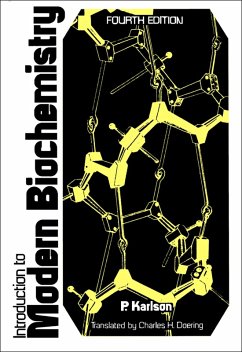Organized into 23 chapters, this edition starts with an overview of the important role of amides in biochemistry. This text then explores the chemical structure of proteins and describes the methods of determining the amino acids sequence of proteins. Other chapters consider the role of genes in protein and enzyme synthesis. This book discusses as well the significance of the submicroscopic structure of the cell in biochemical reactions. The reader is also introduced to the chemistry of the carbohydrates. The final chapter deals with biochemical functions of various organs, including the digestive tract, liver, kidney, nervous system, muscles, and connective tissues.
This book is a valuable resource for biologists, biochemists, scientists, researchers, and readers who are interested in the field of biochemistry.
Dieser Download kann aus rechtlichen Gründen nur mit Rechnungsadresse in A, B, BG, CY, CZ, D, DK, EW, E, FIN, F, GR, HR, H, IRL, I, LT, L, LR, M, NL, PL, P, R, S, SLO, SK ausgeliefert werden.









